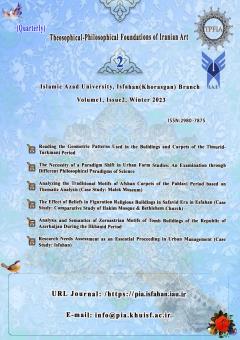Research Needs Assessment as an Essential Proceeding in Urban Management (Case Study: Isfahan)
Subject Areas : ArtMansoureh Kianersi 1 * , Zeinab Talebirizi 2
1 - Department of Architecture, advancement in architecture and urban planning research center, Najafabad branch, Islamic Azad University, Najafabad, Iran.
2 - Department of urban planning, advancement in architecture and urban planning research center, Najafabad branch, Islamic Azad University, Najafabad, Iran.
Keywords: Research Need Assessment, Hekmi urban management, Research needs, Municipality of Isfahan,
Abstract :
Research plays a significant role in the advancement of societies, technological and methodological maturity, and the economic development of nations and states. Among various community practices, it is considered one of the most influential factors. Several key factors contribute to the findings of research studies, including needs assessment and research prioritization, close collaboration between researchers and implementers, evaluation of the extent of needs assessment, and the benefits of research results. To improve the quality of urban management, it is crucial to make informed decisions based on a thorough understanding of existing realities. This necessitates conducting practical and precise studies. Municipalities hold great importance as organizations responsible for city administration and development. Therefore, it is essential to consider their actions and initiatives in enhancing and constructing cities. The present study focuses on the needs assessment in urban management and examines the recurring patterns of research needs assessment in the municipality of Isfahan. The research commenced by identifying relevant subjects such as needs, research needs, and research needs assessment. Following that, the municipality of Isfahan was selected as the case study, and the content of the interviews was analyzed and coded. Additionally, experts and specialists provided further insights through questionnaires. Upon analyzing the questionnaire responses, the study highlights the main reasons for research failures and the impracticality of many studies. One of the contributing factors is the general lack of interest in research, particularly in needs assessment. Two primary factors stand out: the inadequate recognition and definition of research at different levels of the municipality, and the absence of a well-defined and executable phase in research. Furthermore, the research procedure in projects conducted by the municipality of Isfahan revealed existing problems, primarily stemming from weaknesses in the needs assessment. The study also identified flaws in the comprehensive database of research studies, as well as the need for adaptability to changing needs and future perspectives. In summary, research holds immense value in societal advancements, technology, and economic development. Effective needs assessment, collaboration between researchers and implementers, and evaluation of research results are crucial factors in conducting meaningful studies. For urban management to improve, decision-making must be based on practical and precise research. The study specifically examines the needs assessment in the municipality of Isfahan, emphasizing the importance of defining research, designing executable phases, and addressing existing issues in research procedures and data management.
ارفع بلوچی، فاطمه؛ کارشکی، حسین؛ آهنچیان، محمدرضا (1390). ضرورت نیازسنجی پژوهشی در پژوهشهای سازمانی، دومین همایش ملی مدیریت، پژوهش و فناوری، پژوهشکدۀ سیاستگذاری علم، فناوری و صنعت.
رشیدیان، آ.؛ محمدی، ع؛ نژاد، ت. ی.؛ دادگر، ا؛ صلواتی، ص؛ سیدآقامیری، ز. (2018). شناسایی و تدوین اولویتهای پژوهشی حوزۀ بهداشت؛ فرایند، ضرورت و امکانپذیری اجرای آنها در سال 1393. Payavard Salamat, 12(5).
شفیعی، مجتبی؛ مجیدی، میثم؛ غارئیفرد، محمد (1396). دهۀ همکاری ملی برای آب: ضرورت تغییر رویکردهای بخش پژوهش در مدیریت آب کشور با تأکید بر ظرفیتها و بسترهای موجود، اولین اجلاس هماندیشی با متخصصان علوم آب و محیط زیست، وزارت نیرو.
فتحی واجارگاه، کورش؛ خسروی، علیاکبر؛ سعادتطلب، آیتالله؛ نورانی، حیدر؛ دیبا واجاری، طلعت (1389). طراحی مکانیزم اولویتیابی پژوهشی برای نظام آموزش و پرورش ایران (مورد آموزش و پرورش شهر تهران)، مجلۀ مطالعات تربیتی و روانشناسی11 (2)، 210-185.
فتحی واجارگاه، کورش (1390). نیازسنجی پژوهشی (مسئلهیابی پژوهشی و اولویتبندی طرحهای تحقیقاتی) ویژۀ مدیران و کارشناسان واحدهای پژوهشی، نشر آییژ.
فتحی واجارگاه، کورش (1392). بررسی چالشهای آموزش عالی بینالمللی در دانشگاه شهید بهشتی، مجلۀ پژوهشهای آموزش و یادگیری، پاییز و زمستان، سال بیستم، شمارۀ3، 48-35.
کلاهی، ع؛ زهرائی، م؛ عبدی، پ؛ گچکار، ل (1389). اولویتهای پژوهشی شبکه تحقیقات بیماریهای عفونی و گرمسیری کشور در سال88 . فصلنامۀ بیماریهای عفونی و گرمسیری وابسته به انجمن متخصصین بیماریهای عفونی و گرمسیری، سال 15، شمارۀ 50، 18-9.
سایت شهرداری اصفهان (Isfahan.ir)
Brownson, R. C., & Jones, E. (2009). Bridging the gap: translating research into policy and practice. Preventive medicine, 49(4), 313-315.
Byerlee, D. (2000). Targeting poverty in priority setting for agricultural research. Food policy, V 25, Issue 4, 429-445.
Ciarli, T., & Ràfols, I. (2019). The relation between research priorities and societal demands: The case of rice. Research Policy, 48(4), 949-967.
Kaufman, R & English, FW .(1979). Needs Assessment: Concepts and application, Educational Technology
Kaufman, Roger, Hugh Oakley-Brown, Ryan Watkins, and Doug Leigh. 2003. Strategic Planning for Success: Aligning People, Performance, and Payoff s. San Francisco: Jossey-Bass
Nasser, M., & Welch, V. (2013). Prioritization of systematic reviews leads prioritization of research gaps and needs. Journal of clinical epidemiology, 66(5), 522.
Scriven, Michael (1999). The Nature of Evaluation Part I: Relation to psychology, Practical Assessment, Research & Evaluation, Volume 6, Number 11, November, 1999, ISSN=1531-7714
Watkins, Maurya, West Meiers, Yusra Visser, (2012) A guide to assessing needs: essential tools for collecting information, making decisions, and achieving development results, ISBN (paper): 978-0-8213-8868-6, ISBN (electronic): 978-0-8213-8901-0, DOI: 10.1596/978-0-8213-8868-6
_||_
